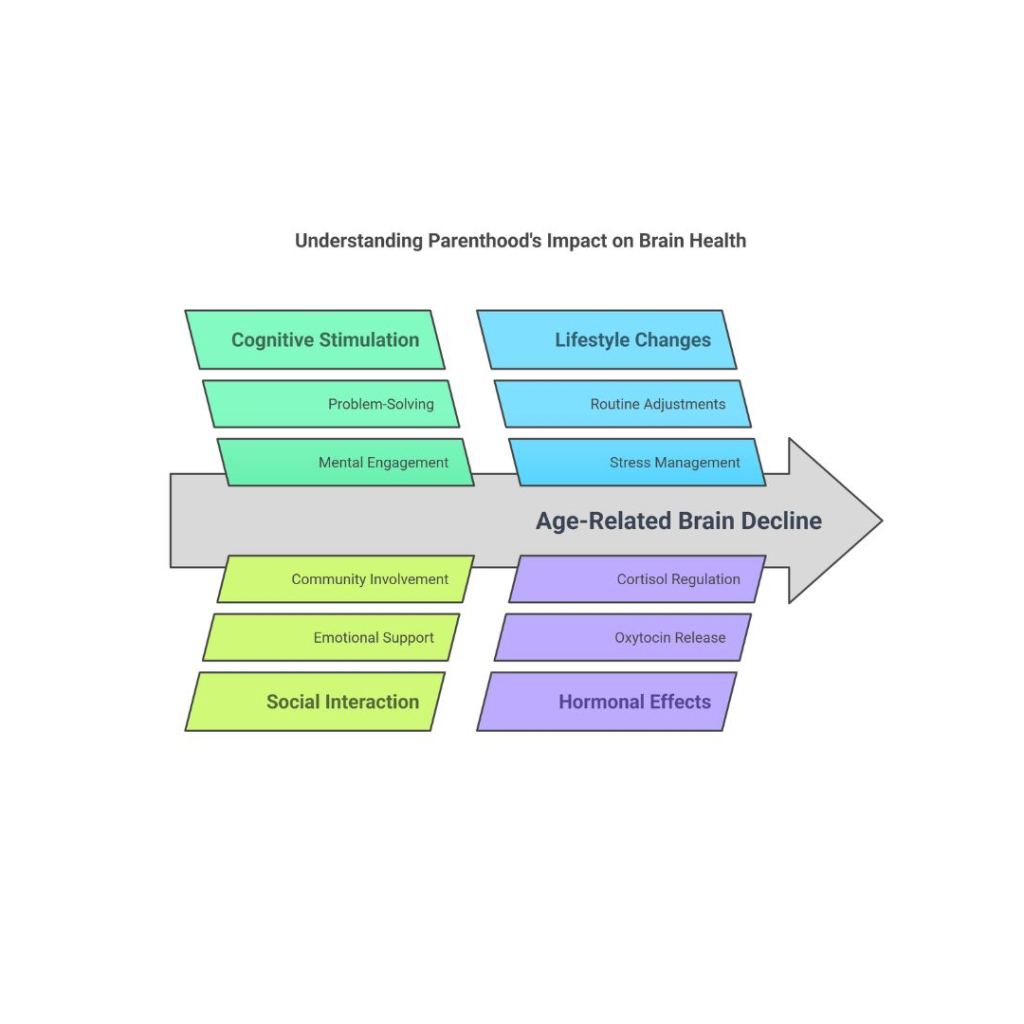Parenthood is often described as a whirlwind of sleepless nights, endless responsibilities, and emotional highs and lows. Yet, amidst the chaos lies an unexpected gift—a benefit that extends far beyond the emotional bond between parent and child. Recent research led by Avram Holmes, associate professor of psychiatry at Rutgers University’s Robert Wood Johnson Medical School, reveals that raising children might actually help protect the brain against age-related decline. Parenthood, it seems, is not just a journey of nurturing others; it might also be a path to preserving oneself.

Table of Contents
Parenthood and Brain Connectivity: A Remarkable Discovery
Imagine the brain as a symphony orchestra, with different regions acting as musicians who must communicate seamlessly to produce harmony. As we age, this communication often falters, leading to diminished cognitive abilities and sensory perception. Holmes’ groundbreaking study, published in the Proceedings of the National Academy of Sciences, challenges this inevitability. Using data from nearly 37,000 adults in the UK Biobank—one of the largest biomedical databases—the research found that parents exhibit patterns of brain connectivity that defy typical aging processes.
The findings were striking: parents with more children showed stronger connectivity in key brain networks responsible for movement, sensation, and social interaction. These same networks are usually the first to show signs of decline with age. Holmes describes it as “a widespread pattern of functional alterations,” where parenting appears to fortify neural connections over time.
The Caregiving Environment: A Shared Benefit for Mothers and Fathers
One of the most intriguing aspects of Holmes’ study is its inclusivity—it’s not limited to mothers or tied solely to biological changes from pregnancy. Fathers also demonstrated similar benefits, suggesting that the caregiving environment itself is the driving force behind these neurological changes. The mental and physical engagement required by parenting—whether it’s chasing toddlers around the house or navigating teenage emotions—creates a form of environmental enrichment that strengthens brain health.
Holmes emphasizes this point: “The caregiving environment, rather than pregnancy alone, appears important since we see these effects in both mothers and fathers.” Parenthood transcends biology; it’s about the shared experience of nurturing, guiding, and connecting with another human being.
Parenting: A Social Lifeline
Beyond neural connectivity, parents in the study were found to have larger social networks and more frequent family interactions compared to non-parents. These social connections are known to promote mental stimulation and emotional wellness—key factors in maintaining cognitive vitality. Parenting doesn’t just expand your heart; it expands your world.
Holmes suggests that these findings could have implications beyond traditional parent-child relationships. Enhanced social interactions and support networks—like those cultivated through parenting—might offer similar brain health benefits even for individuals without children.
A New Perspective on Parenting Stress
For decades, parenting has been associated with exhaustion and cognitive strain—a narrative reinforced by countless anecdotes from weary moms and dads. Holmes’ research flips this assumption on its head. While parenting undeniably comes with challenges, it also offers rewards that are deeply embedded in our biology. Each sleepless night, every moment spent teaching or comforting a child may be quietly reshaping the parent’s brain for the better.
“The regions that decrease in functional connectivity as individuals age are the regions associated with increased connectivity when individuals have had children,” Holmes explains. In other words, parenting doesn’t just drain you—it builds you up in ways you might never have imagined.
What This Means for Society
Holmes’ study opens doors to new ways of thinking about aging and brain health. If parenting can enhance neural connectivity through increased physical activity, social interaction, and cognitive stimulation, could similar benefits be achieved through other forms of caregiving or community engagement? This research invites us to explore how nurturing relationships—whether familial or social—might serve as a powerful tool for preserving cognitive function.
Final Thoughts: The Hidden Gift of Parenthood
Parenthood is often seen as an act of selflessness—a sacrifice made for the benefit of another. But Holmes’ research reminds us that in giving so much to our children, we might also be giving something invaluable to ourselves: protection against the ravages of time. The next time you find yourself overwhelmed by the demands of parenting, take a moment to reflect on this hidden gift—a stronger, healthier brain shaped by love and care.
Parenthood is not just a journey; it’s an investment in both generations—the one you’re raising and your own future self.
Cautionary Conclusion: Balancing the Joys and Challenges of Parenthood
While the findings from Avram Holmes’ research highlight the surprising neurological benefits of parenthood, it is essential to approach this information with a balanced perspective. Parenting, while rewarding, can also be incredibly demanding and stressful. The emotional and physical toll that comes with raising children should not be underestimated.
It’s crucial for parents to prioritize self-care, seek support when needed, and recognize that the journey of parenthood is filled with both challenges and triumphs. The benefits to brain health are significant, but they do not negate the real struggles many parents face daily.
As we celebrate the enriching aspects of parenting, let us also acknowledge the importance of maintaining mental well-being and fostering supportive communities. Parenthood may enhance cognitive resilience, but it is equally vital to care for oneself in this rewarding yet demanding role. Embrace the journey, cherish the moments, and remember that seeking help is a sign of strength, not weakness.



